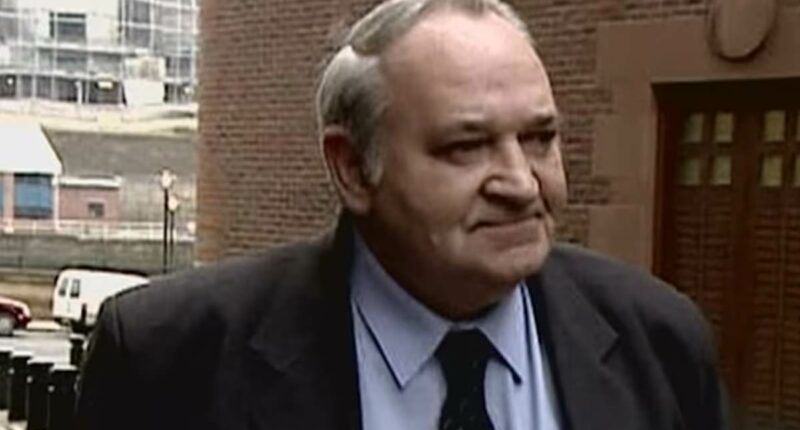Share this @internewscast.com
The UK’s most notorious sex offender managed to commit heinous acts of rape and torture against boys at a borstal where authorities, including the prison service, police, and the Home Office, turned a blind eye to the abuse.
Neville Husband orchestrated a campaign of terror, systematically raping and abusing hundreds of young men and boys entrusted to his care, alongside other staff members.
A shocking report released today uncovers the grim reality of what occurred at Medomsley Detention Centre, where Husband, employed as a caterer, operated between 1961 and 1987 in County Durham.
More than 2,000 young men and boys have come forward, recounting experiences of sexual and physical abuse endured at the former Victorian orphanage over the course of nearly thirty years.
Their horrific crimes were so effectively concealed that Husband was even awarded the Imperial Service Medal for his contributions to the prison service and was accepted into a church as a minister.
The damning report from the Prisons Ombudsman, known as Operation Deerness, reveals the ‘widespread physical and sexual abuse’ at the facility, driven by a culture of ‘familiarity with violence’ towards young offenders.
As of August 2025, the Government Legal Department received 2,831 claims alleging sexual and/or physical abuse at the borstal during this time. Claims suggest a prison officer and a magistrate were involved in the abuse.
From the moment detainees arrived at the centre, they were physically abused and introduced to the ‘short, sharp, shock’ punishment that became embedded as practice at the facility.
The report today brands Husband ‘possibly the most prolific sex offender in British history, as a result of the centre’s ‘culture of silence’.
In the harrowing 202-page probe led by Prisons Ombudsman Adrian Usher reported how,
- The Government Legal Department received 2,852 claims alleging sexual and/or physical abuse at Medomsley Detention Centre as of August 2025
- Of the 549 sexual abuse allegations at the facility, 388 were made against Neville Husband, with all but 50 naming him as the primary abuser
- Staff were aware of Husband’s abuse and would jokingly refer to his victims as his ‘wives’
- In one search of his kitchens, sex toys and pornography were found. He ‘manipulated’ the warden so that the kitchen would never be searched again
- Husband had a ‘great deal of power’ despite being a ‘low-grade member of staff’. He would also carry out attacks alongside colleague Leslie Johnston
- Evidence suggests a local serving police officer was involved in the abuse, with one testimony claiming a magistrate also participated
- Inmates, who were aged between 17 and 21, were subjected to regular violence, with staff encouraging violence and betting on them ‘like dogs’

Catering officer Neville Husband led a reign of terror at Medomsley detention centre where he systematically raped and abused young men

The former Victorian orphanage served as a youth detention centre (pictured). Championed by Margaret Thatcher’s government borstals were known for their brutal military regimes
And those in authority, from staff to the Prison Service and the Home Office, have been accused of turning a blind eye as thousands of victims who have been affected by the violence and ‘predatory sexual attacks’ for life, calling for an apology.
Known for its ‘strict and tough nature’, young men were even forewarned to refer to everybody as ‘Sir’, and after arriving would be subjected to physical abuse while they bathed, were strip-searched, cleaned, worked, and even in medical examinations.
The former Victorian orphanage served as a senior youth detention centre for offenders aged between 17 and 21, who served anywhere between three to six months behind bars for crimes such as shoplifting, non-payment of fines, to robbery.
In 1952, detention centres were introduced as a solution to youth offending, with the brutal military style regimes further championed by Margaret Thatcher’s government. They were abolished as part of the Criminal Justice Act in 1988.
In 1961, the borstal first opened its doors, and four years later Husband joined the team. Just two months into his employment, he began offending at the facility and continued until he left in August 1985.
Of the 549 sexual abuse allegations at the facility, 388 were made against the catering officer, with all but 50 naming him as the primary abuser.
‘The power that Husband wielded over trainees was even more one-sided. The ability to provide or withdraw food gave him opportunities to punish and reward,’ Mr Usher added.
‘The isolation he could engineer for trainees existed not only in the total exclusionary dominance he practised within the kitchens themselves, but was also assisted by the geography of Medomsley itself.
‘When Husband told them that if they spoke out, he could make them ‘disappear,’ it would have been easy for them to believe it.’
And evidence suggests staff were aware that ‘voracious’ Husband abused hundreds of inmates under his charge, with some making jokes of the sexual abuse and referring to his victims as ‘wives’, the Ombudsman said
‘Whether it’s oversight or negligence, if you have a situation where members of staff are sharing jokes about sexual activity, sexual abuse in the kitchens, that points you to the fact that they knew that something was wrong.
‘You are either complicit because you knew and you didn’t do anything, or you are so professionally incurious as to what has gone on, that you’re incompetent.’
He added that staff should have been ‘professionally curious’ about the jokes emerging about the ongoing abuse in the kitchens.
‘How are these jokes coming out about Husband in the kitchen? How are there jokes about Husband’s wives?
‘Everybody who worked at Medomsley in that time, I think, will have calls to examine their own consciences as to what they did, what they didn’t do, and what they did and didn’t say.
‘And there’s undoubtedly within that cohort of staff, people who knew that there was something gravely wrong in the kitchens.’
He added: ‘One search of husband’s kitchens revealed that he had some sex toys with him and some pornography, and the result of that was simply him manipulating the warden into issuing an order that his kitchen was never to be searched again, and it wasn’t.’
In July 1999, Husband was arrested as part of Operation Voice, a Metropolitan police-led UK-wide investigation into the distribution of child sex abuse materials. A search warrant was executed at his home, and over 30 ‘hard-core pornographic videos’ were recovered from his study.
Husband was arrested, charged and suspended from his ministerial roles within the Waddington Street United Reformed Church. However, the case was later dismissed at court due to a delay in the production of a specialist witness for the prosecution.
The church reinstated Husband as a minister in June 2000.
Between 2001 and 2023, Durham Constabulary conducted three investigations, Operation Halter 1, Operation Halter 2, and Operation Seabrook, revealing widespread physical abuse of over 2,000 inmates at Medomsley.
Operation Halter 1 and 2 focused on Neville Husband, who was initially found guilty of 11 sexual offences against six victims, and was sentenced to eight years behind bars.
The second Operation Halter secured four further convictions against Husband for acts against six additional victims in September 2005, bringing the total number of charges against him to 27 alongside 24 victims.
For his crimes, he was sentenced to 10 years behind bars in total.
But, in 2005, a judge said further cases against Husband would be discontinued ‘as it was no longer in the public interest to prosecute him’ – a remark which had significant consequences for many of his victims.
And as of 2019, the Ministry of Justice spent £3.6million settling 237 compensation claims for sexual abuse committed by the kitchen boss, according to the BBC’s Inside Out programme.
The predator was released from HMP Full Sutton in 2009 and died a year later in 2010. But, evidence suggests Husband abused victims before and after Medomsley – and it is likely he may have committed more offences than Jimmy Saville.
‘We’ve every reason to believe that Husband was offending for the whole time, and after he left the prison service,’ Mr Usher added.
‘And of course, he was never held to account while he was professionally employed by the prison service.

Neville Husband pictured in 2003. He was previously convicted of sexual crimes against inmates in 2005

Staff were aware of Husband’s abuse and would jokingly refer to his victims as his ‘wives’, Prisons Ombudsman Adrian Usher said
As a catering officer in Medomsley had ‘sole charge’ of the kitchen, and it was here the ‘powerful and sexually aggressive’ man would exert ‘totally authority’ over 14 trainees he selected, often due to their age, size, height or background.
The predator would remove young men from the kitchen to his office, upstairs, to the storerooms, while others were told to stay behind after their shift. They would often disappear only to return in ‘a distressed state’, the report said.
SHe is also said to have used his position of power to grope young men as he instructed them to put their hands out in front of them to make sure they were clean, and also watched the detainees while they showered.
One of Husband’s victims, only known as Witness D, told of how he was raped by the catering officer in a storeroom, and that he would often be groped by the sex offender, who would physically and sexually assault him.
Another account from a separate inmate told how Husband sexually attacked him after he refused to take off his clothes, adding that he ‘wasn’t a puff’ – asserting he was not a homosexual.
‘[Husband] smacked me hard around the head again and told me to strip off and he laughed at me,’ Witness D said, ‘He put a cord around my throat and neck and began to strangle me with it.’
He alleged Husband then sexually assaulted him while threatening him with a knife. ‘I felt that I was dying as the pain was horrendous.’ Witness D said.
Others recalled how Husband would use inmates to inflict abuse on other young men in the detention centre, with one witness claiming he ordered young detainees to pin down a new arrival and sexually assault him with a broom handle.
‘It was like an initiation thing. I was sitting on the top bunk and watched as three other boys pinned this lad down…,’ a witness said of the incident. ‘Husband was telling the lads what to do.
‘Husband had threatened me, saying he would come for me later, and I was petrified. I wet myself as I was so scared, I was vomiting and was in a real mess. At the cells I didn’t dare sleep as I was certain he would come and kill me…’

Christopher Onslow (pictured) was one of five former Medomsley prison officers jailed for abusing former detainees


John McGee (left) and Brian Greenwell (right) were also jailed for their crimes in the detention centre
From 1967, during Husband’s time at the facility, the age of consent for heterosexual activity was 21. It remained a criminal offence for two or more men to engage in sexual activity in private until the Sexual Offences Act 2003 was introduced.
‘[Some staff] were using violence, and that produced the collusion of silence, and within that, then allows a monster such as Neville Husband – it’s a very fertile ground for him to thrive.’ The Ombudsman added.
‘He was an arch manipulator, a very powerful man, a big man physically, [and] he was a big noise in the local Prison Officers Association (POA). As the chef, he could reward or not with food, which created a great deal of power.’
He added: ‘Husband over a period of decades became increasingly confident that he wouldn’t be caught, and that allowed him then to be constrained only by one factor, and that was his libido.’
‘These young men had no voice outside the walls, and the catastrophic consequences of those five things coming together were a perfect storm that led to the physical abuse of thousands of young men and the sexual abuse of hundreds.’
Husband significant voice in the facility’s POA, alongside his physical intimidation and abuse of other staff as well as inmates, made him a daunting adversary for any warden to have chosen combat.
His offending escalated to include others, such as storeman Leslie Johnston.
There were 33 sexual abuse allegations in which Johnston was named or referred to as an abuser. In two-thirds of these claims, he acted alone, and in the remainder, he was named alongside Husband.
There is no evidence to suggest he had committed sexual offences before joining Medomsley, the report said. Some victims also alleged they were sexually abused by other prison officers or night-time staff.

One inmate described attempting to ‘kung-fu kick’ Johnston and Husband before they threw him to the floor and threatened to murder him while they held a six-inch blade. He claimed they forced him to perform oral sex while holding a ‘knife to [his] throat, before raping him.
‘I was in unbelievable pain and so fearful, I remember thinking ‘you’ll not get out of here alive’. I was in fear for my life,’ the witness said.
Another account alleged the duo suggested to a young man he ‘could easily be found hanging’ if he spoke out in one incident of sexual abuse.
On a separate occasion, they allegedly urinated on one young boy while they both sexually assaulted him, and said, ‘Welcome to Medomsley,’ an inmate claimed.

In one search of his kitchens, sex toys and pornography were found. He manipulated the warden into ordering that the kitchen to never be searched again – and it wasn’t
Johnston most recent reported offences were in 1985, one of which he was later convicted and sentenced to nine months in jail for two counts of indecent assault in 1990. He died in 2007 before Operation Seabrook began.
In a separate account, one victim claimed he had been taken off-site to a ‘posh house’ by Husband, where he alleged to have been sexually assaulted by the kitchen boss and several other men, one of whom a detainee claimed was ‘the b*****d who sent him to Medomsley’.
‘[The inmate] never said it was a magistrate, but that is what I understood him to mean. He said it with surprise as opposed to anger, and as he said it, he was looking in the direction of three to four men, and I didn’t know which one of those men he was referring to.’
According to the report, there is evidence that one of the men involved in Husband’s offending was a local serving police officer.
Meanwhile, evidence suggests Husband’s offending didn’t begin or end at Medomsley with the sex offender seeking out opportunities to obtain positions of power from the age of 14, first as a Scout troop leader, a Sunday school teacher and then roles within the Prison Service.
Before he had even stepped through the doors of Medomsley, Husband was under a police probe for indecent images depicting sexual activity between two men obtained via mail order from Sweden. He told officers this was ‘research’ for a book.
Following his time at Medomsley, Husband was transferred to Deerbolt youth custody centre in 1987, and then HMP Frankland, where further victim accounts suggested he had continued to sexually abuse young men.
There is also evidence to suggest Husband was prevented from returning to the detention centre because staff were aware for several years of the abuse he was perpetrating in the kitchens.
‘Husband received accusations against him at Portland borstal, and they were dismissed by the governor,’ the Ombudsman said
‘And then he’s moved to Medomsley to an environment surrounded by young men. There were also allegations afterwards at Franklin and at Deerbolt, and within the church and his amateur dramatic activities.’
In August 2013, Durham Constabulary launched Operation Seabrook into the serious and systemic physical and sexual abuse in Medomsley over nearly three decades. 2,077 victims came forward.
Nine people were charged, but one died before trial. Six were found guilty of various offences, ranging from misconduct in a public office and indecent assault, actual bodily harm, to grievous bodily harm.
In October 2023, then Lord Chancellor and Secretary of State for Justice Alex Chalk commissioned the PPO to undertake an independent probe now known as Operation Deerness.
It revealed a host of physical abuse committed against inmates regularly in all facets of life, while working, cleaning, showering and while being medically assessed.
Some inmates with disabilities or medical conditions were targeted and humiliated by prison staff in physical education lessons while racist slurs were hurled at other inmates.
One detainee claimed he was called a ‘n*****r man’ and black boy as he was beaten by staff. ‘They nicknamed me ‘chalky’. This was very degrading and humiliating,’ he said.
Officers would also encourage the young men to ‘fight like dogs’, and bet on the winner and would punish them if they lost,’ the report said.
‘They didn’t let it get too far, but it made you feel like a dog set up to fight another,’ one witness said.
There were several barriers in young offenders lodging complaints at the facility, as they were denied visits from family as well as the right to send letters home.
While Medomsley was in operation, two inmates died: Ian Angus Shackleton and David Victor Caldwell, both 18.
Mr Caldwell was an asthmatic – a post-mortem into his death found he died of respiratory failure as a result of an asthma attack.
While findings said he died of natural causes, his family said his death was due to neglect, allegations which were reported in local media.
The allegations were probed by the warden with a report passed on to the regional director. However, Caldwell’s family decided they did not want to pursue the complaint further.
A postmortem into Mr Shackleton’s death found he died of a cardiac arrest following an acute pulmonary oedema due to diabetic ketoacidosis and coma.
The coroner gave a verdict of misadventure and said in the inquest hearing, ‘You should not blame anyone.’
The horrors at Medomsley changed the lives of its victims forever, with many left with mental scars that impact their everyday lives.
‘What for me has been the most shocking part of this is the longevity of the offending that wasn’t stopped, and then the effect that it has had on people’s lives,’ Mr Usher said.
‘I’m talking to victims who are now in their 60s and 70s, and can look back on their whole lives, and you see quite clearly the effect, which has been truly shocking.
‘Some of these men have been unable to form a meaningful human relationship with another human being because they cannot trust anybody.
‘They have very grave trust issues with the state because it was the state that did this to them. They have been unable to hold down jobs.
‘They have, in some cases, lived with a fear of going outside and encountering other people. Some of them encountered Husband again on the streets.
‘The effect of that on these individuals is life-changing,’ he added. ‘I think the most impressive thing about all of those victims is their persistence, tenacity and courage over decades.
‘The lack of leadership within the centre and the lack of aims should have been set from outside, and the lack of governance and oversight meant, as I’ve said in the report, that Medomsley effectively operated beyond the law.
‘Doubtless, there will be those from the prison service who say that this is a historic investigation, and it is, but I hope it acts as a lightning rod for change in some really important areas.
‘We see a constant stream of cases where public trust in the prison service is shaken, and if my investigation can focus some thinking on how best to take forward the prison service, particularly with regard to safeguarding children, then I think those victims can feel that they’ve really achieved something.’
Pia Sinha, chief executive of the Prison Reform Trust said: ‘Today’s deeply distressing report is a sobering reminder of the importance of transparency, safeguarding, oversight, and accountability in our most closed institutions.
‘The abuse suffered by the boys and young men at Medomsley represents a profound failure of care and protection, and it is vital that these truths are recognised and remembered.
‘This report rightly focuses on the specific historical context in which these abuses occurred, and we support its careful and considered approach to drawing conclusions.
‘While it does not seek to assess current conditions, it should prompt reflection among those currently charged with the care of children and young people in custody.
‘Earlier this year, Oakhill Secure Training Centre received its second Urgent Notification, citing serious and systemic failures, including concerns about staff conduct and safeguarding.
‘Separately, children were transferred from Oasis Restore secure school due to safety concerns. These developments, alongside the earlier closures of Rainsbrook and Medway and the removal of children from Cookham Wood after similar issues, further highlight the urgent need for continued vigilance.’

Evidence suggests a local serving police officer was involved in the abuse, with one testimony claiming a magistrate also participated (Pictured: Medomsley)
Andrea Coomber KC, Chief Executive of the Howard League for Penal Reform, said: ‘It is almost impossible to comprehend the scale of physical, sexual and psychological abuse that occurred at Medomsley across three decades.
‘Thousands of young lives were ruined beneath a cloak of secrecy while many of those with the power to make it stop either contributed to the torture or turned the other way.
‘The details are unbearable, but everyone in public life should read the findings of this essential investigation.
‘The appalling accounts shared in the report must alert everyone to the reality of what can happen in places of detention when appropriate safeguards are not in place.
‘While we would hope that it would be much harder for such behaviour to go unchecked today, no one should be complacent; the ombudsman has observed that the complaints process for children is broadly the same as it was then.
‘The ombudsman has, quite rightly, left it to all bodies referenced in the investigation to examine their organisational consciences and determine if there is any action taken today that would diminish, even fractionally, the trauma still being felt by victims. They might also review current procedures and reflect on what could be improved.’
















